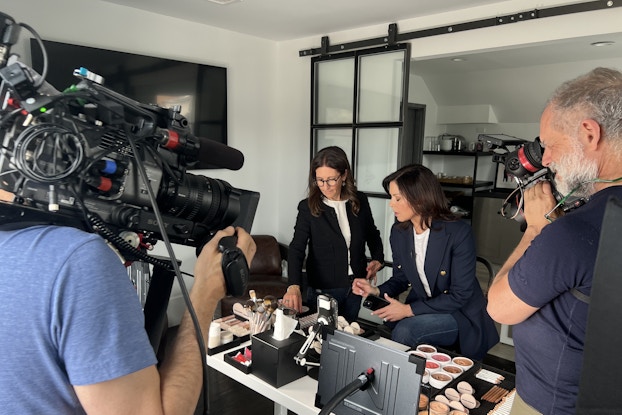
Why it matters:
- The influencer marketing industry is on pace to grow to $21.1 billion in 2023, according to The Influencer Marketing Benchmark Report. Gen Z is swayed by TikTok. According to Mintel, 69% of the cohort learn about beauty via the social platform.
- Despite their power, influencers lost some of their credibility over the past year opening the door for deinfluencers, who discourage consumers from overbuying or falling prey to false claims. The hashtag #deinfluencing has accrued more than 727 million views on TikTok.
- There are strategies brands can take to combat a deinfluencer post, such as a direct response post, improving products to address an issue, or refining the target audience to better reflect a brand’s positioning.
Influencers typically recommend what products to buy. A positive post can send sales into the stratosphere. TikTokers helped sales of products like the Dyson Airwrap, Mini Uggs, and the Stanley Adventure Quencher water bottle to soar. Content creators often show off shopping hauls from retailers like Ulta Beauty, Target, and Shein on social sites.
Recently, a handful of influencers are doing a 180-degree turn and telling people to save their money.

Interested in a small business membership?
Find out how the U.S. Chamber of Commerce can help your company grow and thrive in today's rapidly-evolving business environment. Connect with our team to learn how a small business membership can benefit your bottom line and help you achieve your goals.
“Deinfluencing has evolved as the natural counterbalance to years of traditional ‘influencing,’” explained Marissa Thomas, Vice President, Strategic Partnerships at Popcorn Growth, an influencer marketing agency. “Instead of simply being told which product to buy, deinfluencing is telling social media users which products they may be able to skip, and most importantly why. Some deinfluencers are trying to help people buy less stuff, many are trying to help people only buy the right things for their needs.”
Fueled by an uncertain economy and mounting environmental concerns, definfluencing is gaining traction. The hashtag #deinfluencing racked up 727 million views on TikTok, an increase of more than 300% from February of this year. Beauty and fashion are two of definfluencers’ favorite targets.
At the same time, the credibility of influencers has come under the microscope, especially those pumping out paid posts for brands, and accepting elaborate trips from them. “Deinfluencing can be viewed as more authentic,” said David Silbergleit, CEO of PIMS, which works with brands to assemble customized influencer packages.
A new breed of influencers who cultivate ‘meaningful’ brand partnerships, ‘connection, and deeper storytelling’
“As the space became more saturated, we saw consumers lose confidence in the authenticity of these once-trusted influencer-led conversations. Deinfluencing encouraged consumers to take a step back before purchasing and evaluate if they really needed or wanted the product an influencer or viral TikTok [post] made them think they wanted,” explained Aleni Mackarey, Chief Operating Officer of Base Beauty Creative Agency. "Since many influencers have built their brands based on listening to their audiences, we saw their business goals shift from partnerships focused on purely promoting products for payment. Instead, we work with influencers to create meaningful partnerships with opportunities for connection and deeper storytelling," she explained about her company's approach to the shifting marketplace.
Some content providers simply advise buying less, but others suggest less expensive alternatives which has spawned the increase of “dupes.” Bethenny Frankel has become especially outspoken about pricey beauty product to bypass in favor of drugstore options. One of her Instagram posts pitted Valmont Skincare ($200) versus Nivea ($2 trial size), where she reported the latter provided greater hydration.
Brands such as e.l.f. Cosmetics, NYX, and Milani benefit from the comparisons to pricey brands like Dior, Charlotte Tilbury, and Huda Beauty. When Hasime Kukaj @thebeautyradar compared Milani’s $8.99 Color Fetish lipstick to Charlotte Tilbury’s Pillow Talk (retail $35), Walmart posted a 500% jump in sales and Ulta tallied close to a 4,000-person wait list, according to Milani. Brands that used to whisper that they were similar to prestige products now promote the similarities.
Silbergleit pointed out that deinfluencing is becoming another form of influencing. “They aren’t saying don’t use products, they are suggesting using this product instead. So, they are still promoting a product,” he said. In some cases, the alternatives are gifted to them or they are paid to post.
The hashtag #deinfluencing racked up 727 million views on TikTok, an increase of more than 300% from February of this year.
Deinfluencing isn’t the end of a brand: ‘It's an opportunity to listen to consumers and adjust your product or your messaging’
Getting deinfluenced isn’t as bad as it sounds, suggested Popcorn’s Thomas. Most of the products being discouraged are simply products that don't work for everyone but were advertised with mass appeal, according to Thomas. "One of the dangers of falling victim of deinfluencing is a one-sized approach. In some categories, if you try to appeal to the masses in 2023, you will likely get deinfluenced,” she said.
She uses curly hair as an example. Some products don't work for all hair types. "In 2023, if you aren't upfront about the hair types that your shampoo was designed for, you risk being deinfluenced by people who don't have a great experience with your shampoo," she said. "However, in the process of deinfluencing one brand of shampoo, you often find that same person recommending another product. If you see a TikTok about a product that someone doesn't think is worth buying, either within the video itself or within the top few comments you will see a recommendation of a product to buy instead. Deinfluencing doesn't have to be scary, it's an opportunity to listen to consumers and adjust your product or your messaging. I find the best recommendations from deinfluencing videos."
She purchased a product that was panned by a deinfluencer because it made her hair oily, but Thomas found it perfect for her dry tresses. Her advice? "Be upfront about what your product is and who it is for. Most products being deinfluenced are products that don't work for everyone but were advertised with mass appeal."
Linking up with influencers who are the right fit: ‘Personalization is important’
Mackarey added that brands should not panic if they are mentioned in a deinfluencing post. “Your consumers are talking to you, giving you the chance to listen and learn. Build insights through social listening, analyze them, and strategize on how to react. To avoid this situation, anticipate these consumer responses before engaging in an influencer partnership. Be intentional about the creator you choose, the everyday storytelling their audience expects from them, and how your brand factors into that. If you find synergy, there’s authenticity in the partnership,” Mackarey said. “We recommend making sure you are working with influencers long-term to boost credibility—avoid one-off posts that won’t move the needle and can come off inauthentically. During the sourcing phase, empower the influencers you’re in conversations with to say no if they don’t think this would be an organic fit. This may help you avoid entering conversations surrounding deinfluencing.”
Silbergleit said PIMS works with brands to make sure they link up with influencers who are the right fit. "We are involved right from the start. Personalization is important," he said, adding that the company carefully curates samples to match influencers. That can mitigate the chances of being deinfluenced, he said.
Bobbi Brown: Turning deinfluencing lemons into lemonade with humor and humility — ‘it went viral and quadrupled our business’
Sometimes a direct response is the best. After finishing her non-compete with Estée Lauder (which purchased her namesake brand in 1995), Bobbi Brown launched a new line called Jones Road Beauty. She created a tinted moisture balm with the cheeky name “WTF,” short for “What the Foundation.” "I never thought I could name a product that," Brown told attendees at a beauty gathering hosted by BeautyMatter earlier this year.
Little did she know the name would be the least of the controversy surrounding the launch.
Meredith Duxbury, an influencer with 18.3 million TikTok followers who is known for her heavy-handed foundation application, test-tracked WTF with a sign-off of saying it was a "no" for her. A neophyte to TikTok, Brown decided to give the social site a whirl, first posting an educational message on how to properly use the product (sparingly per the directions) followed by a tongue-in-cheek video where she mimicked Duxbury’s technique that she agreed as she chuckled that it didn’t work. “’Foundation-gate’ is real,” joked Brown, who said she had poster’s remorse and swiftly asked her son Cody Plofker, who serves as her Chief Marketing Officer, to halt the TikTok.
“He said it was too late and that the train had left the station,” she recalled. “It went viral and quadrupled our business.”
CO— aims to bring you inspiration from leading respected experts. However, before making any business decision, you should consult a professional who can advise you based on your individual situation.
CO—is committed to helping you start, run and grow your small business. Learn more about the benefits of small business membership in the U.S. Chamber of Commerce, here.







